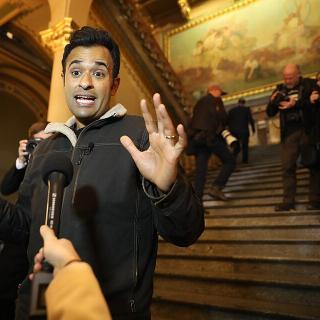In a time when American politics keeps getting more bizarre, yet another bizarre occurrence happened last month when the two leading progressive candidates in the Democratic primary were pitted against each other, resulting in what could only be described as a “hot mic heard around the world.”
Immediately after the Democratic debate in January, Senator Elizabeth Warren (D-MA) approached Senator Bernie Sanders (I-VT) to tell him she thought he had just called her “a liar on national TV.” Sanders was going in for the typical post-debate handshake when Warren blindsided him with the comment, ultimately not even shaking his hand. However, because viewers couldn’t hear what was said until later, CNN’s commentators spent the next 24 hours salivating and speculating about what kind of drama had just gone down. Naturally – and as I predicted – CNN magically “recovered” the audio the next day, ultimately revealing what Warren said.
The two progressive campaigns already had a hell of a few days before the “hot mic” moment occurred, which obviously gave it more gravity. According to sources within the Warren campaign, Warren and Sanders had reportedly met in December 2018 to discuss the prospect of them both running for president in 2020, during which Sanders allegedly told Warren that “a woman couldn’t become president.”
Like any upset person would do, Warren waited over a year until the day before the January 2020 debate to leak the info to CNN (the network hosting said debate) and created a supposed rift between the two old friends for a juicy story. CNN naturally asked them about the issue during the debate, which Sanders explained as a misunderstanding, but Warren seemed to still be ticked about whatever was said. Cue the post-debate “hot mic” moment, which played every few minutes on loop like an ESPN highlight reel.
Several people have speculated about what Warren’s motives really were for the entire ordeal. Perhaps her campaign team – made up of several ex-Clinton campaign staffers – finally told her that she needed to peel more supporters away from Sanders or she wouldn’t hit the magic 15 percent minimum needed to earn any delegates in Iowa’s caucus at all.
Perhaps Warren realized she didn’t have a path to the nomination as her numbers have continued to slip and she needed to make a power play. Perhaps she’s already decided to pursue the VP nomination from either Sanders or the other frontrunner, former vice president Joe Biden, and needed to put Bernie and his team on notice to not underestimate her. Again, all of this is purely speculation, as only Warren and Sanders know the truth about what happened.
Of course, many others in the progressive movement rightfully pointed out that the Warren and Sanders camps becoming more divided is not good. On the contrary, it only helps the enemies of both politicians, from the pharmaceutical industry to the big banks and other corporate power players in the media and Washington. While there have certainly been some ups and downs throughout the campaign season, one hope that some progressives were hanging onto was that maybe, just maybe, someday Sanders and Warren could team up to become the progressive power ticket that many on the left want to see.
That could still very well be a possibility, as Sanders and Warren seemed to be fine once again only days later during the annual Martin Luther King Jr. celebrations in South Carolina. However, now the question is whether the rift between the two senators’ supporters has become too big to fix. Many of Sanders followers openly wrote online ad nauseum about how Warren and her team had ruined any chance of them supporting her later on, which is unfortunate considering how similar their supporters’ goals are and the forces they’d face in the general election if either became the nominee.
This is why Warren’s objectives with the “hot mic” move were so puzzling – has everything already been forgotten and forgiven? If she has to drop out of the race after Iowa and New Hampshire, will she endorse Bernie? Wouldn’t her long-term goals be better served by putting any political power she has left behind her longtime friend and ally in the Senate? If so, why do any more damage to another progressive when there is so much work to get done ahead?
Perhaps both Warren and Sanders have come to their senses after their frivolous fight, so that when the first few contests in February are over they can join forces again, as Bernie continues to surge in the polls and is quickly becoming the frontrunner for the nomination. Warren’s supporters would make strong campaign allies in addition to the already burgeoning Sanders team and their goals would be better served if they work together – just like they’ve done so far for so long.



